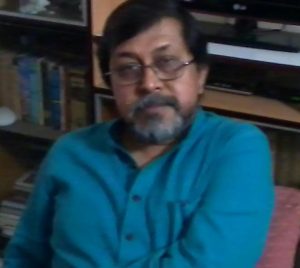Curtain Falls by Sonjoy Dutta-Roy
(August 2010: to my Parents, who left in quick succession)
Diary Poems and Story Teller’s Rhymes
A storm howled through the house for months
An old house shaken to its foundations
And a lost breeze weeps through the windowpanes
Chasing a whirlwind of ghosts through the by lanes
That shoot across the city’s distant horizon,
Or flutters on the glass like a trapped moth
As the raindrops mist the eyes of the sun.
An eerie silence descends, and a vast emptiness.
It is night and there is not a wink of sleep in my eyes.
In this dark night of sorrow, you come
You come to me, Oh my stark God of loneliness
As the lightning streaks the sky asunder
Striking the darkness unconscious with its thunder
That knocks on my rattling doors.
I will open them wide and let you in,
Oh stranger, my ever welcome stranger,
In this dark night of sorrow,
Come, Oh come to my house my friend
What message do you bring at the hour’s end
Come, my dear composite ghost from land’s end
And we will share our half drunk bottle of rum
And from your Poet God’s sacred text
Sing a full song, or half a melody hum.
The bottle lies empty
The songs reverberate into the echoing silence
That descends as the storm recedes into the blurred edges of night and day.
The composite ghost has departed, how could it stay
As the sun dawns over my lunar half-drunk pretense.
The house lies empty.
The beam from the skylight
Brings the imprint on the sofa in the spotlight
Light, curtain calls and departure!
The script gets scattered from a heap
Fluttering in the whirr of a rotating breeze
Directorial instructions encrypted deep
The last scene etched in an eternal freeze.
Spotlights, music and the final overture!
Before the exit through the wings.
Oh still that farewell gesture!
Prof. Sonjoy Dutta-Roy, of the Department of English, University of Allahabad, is a multifaceted personality. Apart from being a brilliant teacher and scholar, he is an accomplished theatre-person – actor, director and singer – and he is a distinguished poet. Creativity is either there in a person or it is absent; if it is, it can come in myriad forms. A truly creative person is content anywhere or everywhere because creativity is an end in itself. I love his poems for their genuineness. Only a person such as him could be behind such poems. I am thrilled to be able to present some of his poems for lovers of poetry, with a few comments for which I am solely responsible. The misreading is entirely mine. To be able to look into a poet’s soul is an act divine; neither mine nor thine. I would like to point out that this is a personal poem of an elegiac nature and should be read as such. This is the first of some blog posts on his poems.
The first stanza of the poem begins as a narrative. But the narrative ceases before the stanza can end. Just as life stops suddenly, the narrative is made to stop and is replaced by a “trapped moth/ As the raindrops mist the eyes of the sun.” For a son, the death of parents cannot mean a total delinking from them. The soul has left the body but is still there, somewhere.
The moment of death has been portrayed powerfully and romanticized like a grand retreat. For a caring son there can be few happenings worse than this dark moment but in retrospect, it is possible to see how it all happened, with the sublimity of the event overpowering its tragic element. Lines like the ones that follow, are not easy to find. There will be more trendy lines and more intelligently written ones but lines so feelingly rendered are rare:
An eerie silence descends, and a vast emptiness.
It is night and there is not a wink of sleep in my eyes.
In this dark night of sorrow, you come
You come to me, Oh my stark God of loneliness
As the lightning streaks the sky asunder
Striking the darkness unconscious with its thunder
That knocks on my rattling doors.
Death has been shown as coming, not without warning; the skies themselves are affected. I am reminded of Shakespeare’s lines:
“When beggars die there are no comets seen;
The heavens themselves blaze forth the death of princes.”
These lines and the ones with which the poem opens show a son regarding his parents to be no less than monarchs because nature is responding to their leaving. Indeed that is how caring sons should consider parents.
Death invited like a guest of honour, almost like a bride to be embraced amid carousing and song, gives a unique grandeur to the poem. Sentimentality is replaced by romance in a poem that blends the ode and the elegy. It is a poem to be remembered as a unique poetic farewell sung by a son. The last line, the poet tells me, contains a pun in the word, “still”:
“Oh still that farewell gesture!”
- How Authors Can Sell More Books - April 11, 2018
- Pure Fiction - December 13, 2017
- I Think I Know - December 12, 2017

Comments